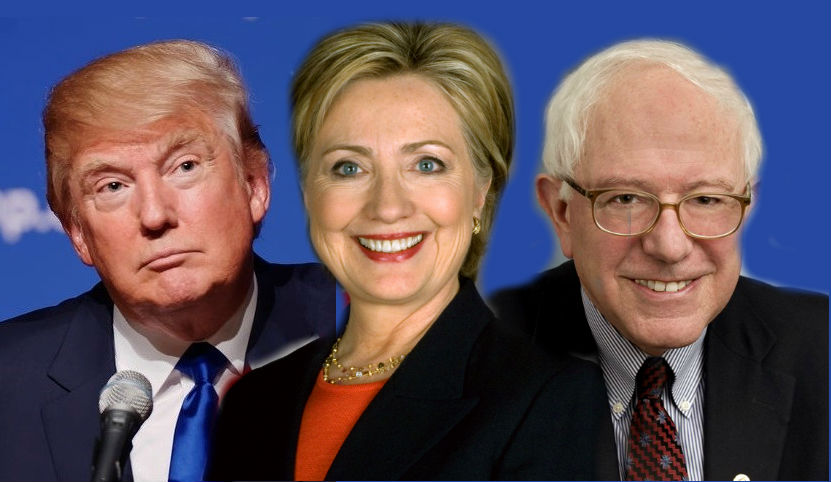by PharmacyChecker.com | Mar 4, 2016 | Drug Importation, Drug Prices, Government

Yesterday, our CEO, Tod Cooperman, MD, applauded leading presidential candidates for supporting legal reforms to make it easier for Americans to buy lower cost medications from other countries.
“With millions of Americans doing this safely for more than a dozen years, it’s time for our government to stop threatening and scaring consumers and simply do what’s right: Make personal drug importation fully legal. Every presidential candidate should support this,” says Dr. Cooperman.
To read the full press release, go here: http://www.pharmacychecker.com/news/trump-clinton-sanders-support-drug-importation.asp.
Tagged with: Bernie Sanders, Donald Trump, Drug Importation, Hilary Clinton, Tod Cooperman
by PharmacyChecker.com | Oct 16, 2015 | Drug Prices

“Migraine” by Sasha Wolff from Grand Rapids – Can’t Concentrate: 14/365. Licensed under CC BY 2.0 via Wikimedia Commons.
Dr. David Belk, a practicing physician in California, healthcare cost research guru and Huffington Post blogger, recently wrote a story about the huge difference in price faced by one of his patients when trying to fill a prescription for the migraine medication called Maxalt (rizatriptan). Since my daughter suffers from migraines, I know how debilitating migraine headache can be and how important it is to have the medication when you need it.
Essentially, Dr. Belk discovered that Walgreens, a big chain pharmacy, was charging much more money than another pharmacy – in this case Costco. The price for the generic at Walgreens without insurance was $1,490 for 40 pills, or $37 a pill, and even with insurance the price was almost $17 dollars a pill. But Dr. Belk’s patient ended up getting the medication at Costco for $1.03 per pill!!
Now ordinarily here’s where we’d write about how you might consider PharmacyChecker- verified international online pharmacies to purchase Maxalt or rizatriptin if you don’t have insurance – but you would not need to. According to Dr. Belk’s post, Costco’s price was the cash price! None of the online pharmacies in our program sell it for just over a buck a pill. It’s the cheapest in the U.S.A.!
A few months back, Tod Cooperman, MD, founder of PharmacyChecker.com was on Fox and Friends talking about another big chain pharmacy, one accused of overcharging consumers for generic medications. It seems that the problem is not just Big Pharma but Big Pharmacy.
Drug prices these days seem to be all over the place. The moral of this story: shop around as much as possible and don’t trust your friendly neighborhood chain pharmacy or assume that international online pharmacies are cheapest. I know it’s enough to give you a headache, even a migraine, but finding the lowest drug prices will help lessen the pain.
Tagged with: Dr. David Belk, Drug Prices, Huffington Post, maxalt, migraine, rizatriptan, Tod Cooperman, walgreens
by Gabriel Levitt, President, PharmacyChecker.com and Prescription Justice | Mar 20, 2015 | Drug Safety, FDA, Generic drugs
As we all know, an unaffordable drug is neither safe nor effective. No less true, an ineffective drug, whether dirt cheap or super expensive, can have hazardous health consequences, even death. That’s why consumers seeking low cost medication online look to avoid bad meds by finding accredited online pharmacies with a PharmacyChecker or VIPPS seal. But that might not always be good enough…
People don’t like to talk about it but sometimes switching from a brand name med to an “equivalent” generic can lead to serious health problems. And this happens at your local U.S. pharmacy, not just online. Tod Cooperman, MD, president of PharmacyChecker.com, knows about this more than most people. In his capacity as president of ConsumerLab.com, he participated on an expert panel at a Congressional briefing this past Wednesday, organized by a new group called the Safe Medicines Coalition led by economist and counterfeit drug expert Roger Bate, PhD. The panelists and others are authors of a new paper called “Drug Inequality: Allowable Variations and Illegal Underperformance in Off-Patent Drugs.”
Dr. Cooperman’s main contribution to the panel comes from his experience testing a generic version of the anti-depressant Wellbutrin XL. To make a long story short, in 2007 ConsumerLab.com tested Teva’s FDA approved generic of the 300 mg version called Budeprion XL – an extended-release product. A generic drug that is bioequivalent to the brand name drug is supposed to work pretty much the exact same way as the brand. Consumerlab.com found that Teva’s generic did not dissolve like Wellbutrin XL – it released the drug much too quickly. It took the FDA more than 5 years but it finally conceded that the product was not bioequivalent to the brand product because it released the active ingredient much faster.
According to the People’s Pharmacy, people taking this generic were feeling more depressed, and even suicidal – until they switched back to the brand or to a different generic. The People’s Pharmacy and ConsumerLab.com shared this information with the FDA back in 2007 only to be ignored.
In order for the FDA to approve a generic drug for sale in the U.S., it must be proven to be bioequivalent to the brand name drug –delivering approximately the same amount of drug over the same amount of time in a group of healthy volunteers. It turns out that Teva never did this for the 300 mg version of Budeprion XL. The FDA approved the drug anyway, based on the data and approval for a lower strength version, Budeprion XL 150mg. What’s more amazing is that generic medications, even though they are not the exact same as their brand name counterparts, under U.S. law, must have the exact same clinical data in their package inserts as the brand name drug. That is, the data shown in the insert is NOT actually the data for that generic. This is meant to give the impression that all generics are the same as the brand name product, even though that’s not the case. If that doesn’t seem to make sense then you’re thinking clearly.
In 2012, the FDA admitted ConsumerLab.com had been right, and stated that Budeprion XL 300mg is was not bioequivalent to Wellbutrin XL 300mg.
Dr. Harry Lever, a cardiologist, talked about patients who were not responding well when switched to certain generic heart medications, such as beta blockers. Most interestingly, problems not only occurred when patients switched from brand to generic but even from generic to generic, which takes us back to the efforts of ConsumerLab.com above and moves us into a new point: Not all generic drugs are equal to each other, and a particular generic might work better in one patient than another!
The key takeaway from Dr. Lever’s and Dr. Cooperman’s presentations is that if a certain generic drug is working for you, then try and stay on that exact same medication. You’ll find it’s not easy because pharmacies often interchange generic drugs in their dispensing practices. You can avoid this by making sure you ask for the same generic, meaning the same manufacturer, each time you visit the pharmacy.
Mr. Bate focused on the fact that drug quality, generally, is not equal from manufacturer to manufacturer, brand to generic, generic to generic, country to country, etc. Mr. Bate is not saying that most generic drugs don’t work but simply that they are not exactly the same. Dr. Preston Mason supported this by presenting data based on testing generic versions of Pfizer’s Lipitor. He found that different versions were not all equal. The lowest quality products, based on number of impurities, were made in India for export to poorer countries.
The final presenter was Dinesh Thakur, the whistleblower that outed major manufacturing problems and corruption at Indian drug manufacturer Ranbaxy. Ranbaxy was actually granted the first go at marketing generic Lipitor in the U.S., but their version was eventually recalled due to small particles of glass that may have contaminated the product. You might find FDA’s nuanced position on the recall instructive and of great interest: “Patients who have the recalled medicine can continue taking it unless directed otherwise by their physician or health care provider….To date, FDA hasn’t received any reports of injury….The possibility of adverse health problems related to the recalled atorvastatin is extremely low.” I don’t recall hearing that the drug was not effective either but its recall was precautionary.
So what the hell are average consumers and even their healthcare providers to make of all of this? I’m going to copy and paste from ConsumerLab.com:
- If a generic doesn’t work like the original drug, be concerned, particularly if it is an extended release (often called “XL”) product.
- Be aware that the labeling on a generic drug describing its performance is copied from the labeling of the original product and may not reflect the performance of the generic. This is a deception required by the FDA, perhaps to create the perception of generics as interchangeable.
- If a generic works for you, look carefully at the label and identify the manufacturer. Request the same manufacturer each time you refill that prescription. Other generics may not behave the same way.
From my perspective, despite the FDA debacle with generic Wellbutrin XL discussed above, the FDA is one of the best drug regulatory agencies in the world. Following the advice above, you can and should trust generic drugs sold in the United States. What about generic drugs sold over the Internet from foreign countries? Pharmaceuticals sold in the most highly regulated countries are generally equivalent in quality and efficacy to those sold in the United States. What about from Indian pharmacies? The highest quality medications sold in Indian pharmacies are on a par with those sold in the U.S., too, but there’s more deviation and far too little oversight from the Central Drugs Standards Controller Organization, India’s FDA.
For all of these reasons, if you’re buying online and getting a drug internationally stay away from websites that are not credentialed by PharmacyChecker.com. And remember, despite crazy price increases in a good number of generic drugs, most generic medications approved for sale in the U.S., sold at local pharmacies are less expensive than International online pharmacy prices – even cheaper than India! However, brand name products are usually far less expensive outside the U.S. (and apparently sometimes safer than generics) – and you can check those prices on www.PharmacyChecker.com.
Tagged with: Consumerlab.com, Roger Bate, Safe Medicines Coalition, Tod Cooperman, VIPPS




